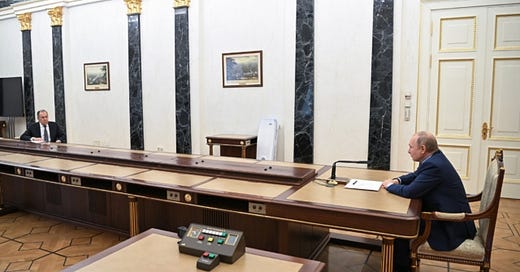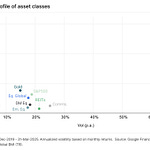To investors,
The Russia-Ukraine conflict continued to increase in intensity over the weekend. While the violent combat has been playing out on the ground, the United States and their allies have been busy waging economic war against Vladimir Putin and Russia.
There were a few key decisions made in the last 72 hours that got me thinking — we are watching a repeat of the conundrum that the Federal Reserve was in during the 2020 COVID crisis.
First, let’s go back in time and revisit what happened in 2020. During March of that year, the government recognized the severity of the pandemic and ordered government-mandated lockdowns across the country. This created a significant slowdown in the velocity of money, forced thousands of businesses to shut down, led to millions of people filing for unemployment each week, and financial markets saw the worst liquidity crisis since the Global Financial Crisis.
The Federal Reserve, in concert with their political colleagues, made the quick decision to do two things: (1) manipulate interest rates to 0% and (2) pump trillions of dollars into the financial system. There will be many books written about the efficacy of those decisions, including the size and scope. Regardless of where you come out on the impact of the monetary and fiscal decisions in 2020, it is clear that decision-makers optimized for mitigating short-term pain over the long-term potential consequences.
As you would expect, these short-term optimized decisions led to significant long-term issues. We have inflation at the highest level it has been in 40 years, the wealth-inequality gap is wider than it has ever been, unemployment is still higher than pre-pandemic, and financial markets swing with the significant volatility.
Was the short-term trade-off worth it?
It is impossible to know. We will never be able to identify how bad the economic situation in 2020 would have became without the Fed and politician’s intervention. We do know how bad the long-term impact has become though. Short-term optimization in the face of long-term sound decision-making is a story as old as time.
The United States is facing the exact same situation again — this time with a geopolitical twist.
Russia’s invasion of Ukraine has forced the hand of NATO to respond. The consensus belief is that these countries will refrain from engaging in direct combat, but instead pursue economic sanctions against Putin, Russian banks, various Russian citizens, and the central bank of Russia.
These hard-hitting measures are meant to inflict maximum pain on the country. It is important to remember that the leader of a country is almost never directly impacted by the financial sanctions levied, but rather the goal of the sanctions is to inflict pain on the citizens of Russia with the hopes that they will rise up and remove their leader. This is true of the sanctions targeting a variety of Russian oligarchs, but also of the average citizen as well.
When Russian banks, or the country’s central bank, are sanctioned, the average citizen in Russia is who feels it most. They can’t use the bank. They can’t withdraw money. They can’t send money to loved ones. It becomes incredibly difficult to purchase goods and services. The billionaires and oligarchs have their assets frozen or confiscated. The list goes on and on.
This morning the United States took these economic sanctions one step further and banned any US citizen or company from conducting business with Russia’s central bank. The only other time that the US has ever pursued an action this severe has been in Iran, which has played out over the last decade or so.
Now I’m not an expert on geopolitics, nor am I an expert on the economic impact of financial sanctions on NATO’s adversaries. I know enough to be dangerous, but I don’t want to waste our time regurgitating what you can read elsewhere.
Instead, I think it is important to call out that the United States and NATO are making a very specific trade-off decision — mitigate the short-term problem at the cost of a long-term problem. This is a repeat of the Federal Reserve’s decision during 2020.
The short-term risks vary from the invasion of Ukraine to all-out nuclear war. It makes sense why the United States and their allies are pursuing the economic sanctions to neutralize as many of these situations as possible. If you’re going to err, it is better to err on the side of too aggressive here.
But these actions don’t come without long-term consequences. Countries around the world have been officially put on notice — if you use the US dollar system, the health and sovereignty of your financial system are solely dependent on keeping a good relationship with the United States.
While most countries disagree with Russia’s decision to invade Ukraine, and are celebrating or participating in the financial sanctions, they will likely all start developing a plan to reduce dependence on the US dollar system in the future. They understand that there is no resiliency without an insurance policy or back-up plan.

The historical options were to hold foreign currencies or gold, but that doesn’t seem to be a viable plan for Russia as we are watching in real-time. This leads me to believe that countries will choose to build SWIFT equivalents outside the US dollar system (ex: Russia claims they have one internally already), set up non-USD accounts with various trading partners, and begin to heavily investigate digital currencies.
The bitcoin community has obviously been saying for years that countries will eventually adopt digital, decentralized money. This may be true or it may not, but it isn’t the only option. Take China as an example — they superpower will likely accelerate their plans for a digital renminbi or central bank digital currency.
The Chinese digital currency won’t be decentralized, but it will operate on payment rails outside the US dollar system. It provides total control to the Chinese government and prevents any attempts by the US or NATO to sanction China financially. We haven’t seen this type of system stress-tested yet, but I have to think that situation is coming in the next few years.
We also shouldn’t discount bitcoin either. The decentralized currency is a neutral technology that can be used by anyone, either friend or foe. While most people are talking about Russia potentially using bitcoin to circumvent the sanctions, we saw the Ukrainian government post a bitcoin address on Twitter and ask for donations to help fund their defense efforts. Consider the fact that millions of Ukrainian and Russian citizens are going to want to move geographically because of this conflict and it becomes obvious that bitcoin would be the superior way to take their economic wealth with them.
There are no winners in war. The United States and NATO are being forced to respond to the invasion of a sovereign nation by a nuclear-armed country that happens to be one of the largest energy producers in the world. The geopolitical chess that is unfolding is hard to keep up with. It is nearly impossible to know which decisions are right and which are wrong. Eventually we’ll be able to evaluate the efficacy with the benefit of hindsight, but we aren’t afforded that luxury today.
One thing is clear though — the United States and their partners are making decisions to mitigate short-term risk but it will come at the expense of long-term problems. Maybe we can address the long-term problems later or maybe not. It is unfair to play Monday morning quarterback, so we must simply be aware of the trade-off we are pursuing and then work to make the best of the situation.
I’ll continue to spend time learning about this situation and thinking through the various implications. If you have any ideas or insights, please share them with me on Twitter or through the newsletter. Hope each of you has a great start to your day. I’ll talk to you tomorrow.
-Pomp
SPONSORED: Bitwise is one of the largest and fastest-growing crypto asset managers. As of December 31, 2021, the company managed over $1.3 billion across an expanding suite of investment solutions, which include the world's largest crypto index fund and other innovative products spanning Bitcoin, Ethereum, DeFi, and crypto equities. Whether you’re an individual, advisor, or institution, Bitwise provides intelligent access to crypto with your unique circumstances in mind. Visit www.bitwiseinvestments.com to learn more.
Certain of the Bitwise investment products may be subject to the extreme risks associated with investing in crypto assets. Visit www.bitwiseinvestments.com/disclosures/ to learn more.
Podcast Sponsors
These companies make the podcast possible, so go check them out and thank them for their support!
Bitcoin 2022 is the largest Bitcoin event in the world that takes place 4/6 - 4/9 in Miami Beach. Click HERE to learn more and use promo code POMP for 10% off.
Fundrise is largest direct-to-investor real estate investment platform. Go to Fundrise.com/Pomp today and get $10 when you place your first investment.
Unstoppable Domains’ 10 NFT domain endings are now fully integrated with Trust Wallet. Claim your Unstoppable Domain here today.
Brave Wallet is the first secure crypto wallet built natively in a web3 crypto browser. Download the Brave privacy browser at brave.com/Pomp today.
Abra lets you trade, borrow, and earn interest on crypto. Earn up to 13% interest on USD stablecoins or crypto, borrow USD stablecoins, and trade in 110+ cryptocurrencies in a simple, secure app. Download Abra and get $15 in free crypto when you fund your account.
FTX US is the safe, regulated way to buy digital assets. Trade crypto with up to 85% lower fees than top competitors by signing up at FTX.US today.
Compass Mining is the world's first online marketplace for bitcoin mining hardware and hosting. Visit compassmining.io to start mining bitcoin today!
Choice is rebuilding the way bitcoiners approach retirement by making it possible to invest in digital assets inside your IRA. Visit choiceapp.io/pomp
BlockFi provides financial products for crypto investors. Those products include BlockFi Wallet, no fee Trading, crypto collateralized Loans and the World's First Crypto Rewards Credit Card. To get $75 back on the first swipe of your BlockFi Rewards Credit Card, sign up today at http://www.blockfi.com/Pompcc
LMAX Digital is the market-leading solution for institutional crypto trading & custodial services. Learn more at LMAXdigital.com/pomp
Okcoin is the first licensed exchange to bring new cryptos to market. To get started, and go to okcoin.com/pomp
Exodus is the world’s leading desktop, mobile, and hardware crypto wallets, with over 150 assets. Founded in 2015 to empower people to control their wealth. Visithttp://exodus.com/pomp today.
You are receiving The Pomp Letter because you either signed up or you attended one of the events that I spoke at. Feel free to unsubscribe if you aren’t finding this valuable. Nothing in this email is intended to serve as financial advice. Do your own research.













Share this post